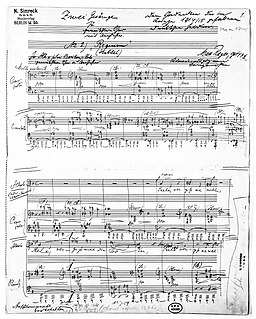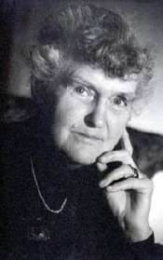
Upshur County is a county in the U.S. state of West Virginia. As of the 2010 census, the population was 24,254. Its county seat is Buckhannon. The county was formed in 1851 from Randolph, Barbour, and Lewis counties and named for Abel Parker Upshur, a distinguished statesman and jurist of Virginia. Upshur served as United States Secretary of State and Secretary of the Navy under President John Tyler.

Johann Baptist Joseph Maximilian Reger, commonly known as Max Reger, was a German composer, pianist, organist, conductor, and academic teacher. He worked as a concert pianist, as a musical director at the Leipzig University Church, as a professor at the Royal Conservatory in Leipzig, and as a music director at the court of Duke Georg II of Saxe-Meiningen.
The year 1905 in architecture involved some significant architectural events and new buildings.
Janet Reger was British lingerie designer and business woman, best known for her eponymous lingerie brand which became famous in the 1960s and 1970s.

William Thomas Danoff is an American songwriter and singer. He is known for “Afternoon Delight", which he wrote and performed as a member of the Starland Vocal Band, and writing hits for John Denver, such as "Take Me Home, Country Roads".

Montgomery Rufus Karl Siegfried Straube was a German church musician, organist, and choral conductor, famous above all for championing the abundant organ music of Max Reger.

The 25th Virginia Infantry Regiment was an infantry regiment raised in Virginia for service in the Confederate States Army during the American Civil War. It fought mostly with the Army of the Northwest and Army of Northern Virginia. Its soldiers saw action from the first battle (Philippi) until the last (Appomattox).

Max Reger's 1915 Requiem, Op. 144b, is a late Romantic setting of Friedrich Hebbel's poem "Requiem" for alto or baritone solo, chorus and orchestra. It is Reger's last completed work for chorus and orchestra, dedicated in the autograph as Dem Andenken der im Kriege 1914/15 gefallenen deutschen Helden.

The Reger-Chor is a German-Belgian choir. It was founded in Wiesbaden in 1985 and has been conducted by Gabriel Dessauer in Wiesbaden. Since 2001 it has grown to Regerchor-International in a collaboration with the organist Ignace Michiels of the St. Salvator's Cathedral of Bruges. The choir performs an annual concert both in Germany and Belgium of mostly sacred choral music for choir and organ. Concerts have taken place regularly in St. Bonifatius, Wiesbaden, and in the cathedral of Bruges in its series "Kathedraalconcerten". The choir performed additional concerts at other churches of the two countries and in the Concertgebouw of Bruges.
Reger is a surname of German origin.

The Bluefield Formation is a geologic formation in West Virginia. It preserves fossils dating back to the Mississippian subperiod of the Carboniferous period. Sediments of this age formed along a large marine basin lying in the region of what is now the Appalachian Plateau. The Bluefield Formation is the lowest section of the primarily siliciclastic Mauch Chunk Group, underlying the Stony Gap Sandstone Member of the Hinton Formation and overlying the limestone-rich Greenbrier Group.

Der 100. Psalm, Op. 106, is a composition in four movements by Max Reger in D major for mixed choir and orchestra, a late Romantic setting of Psalm 100. Reger began composing the work in 1908 for the 350th anniversary of Jena University. The occasion was celebrated that year with the premiere of Part I, conducted by Fritz Stein on 31 July. Reger completed the composition in 1909. It was published that year and premiered simultaneously on 23 February 1910 in Chemnitz, conducted by the composer, and in Breslau, conducted by Georg Dohrn.

Vier Tondichtungen nach A. Böcklin, Op. 128, is a composition in four parts for orchestra by Max Reger, based on four paintings by Arnold Böcklin, including Die Toteninsel. He composed them in Meiningen in 1913.

Elsa Reger was a German writer, the wife of the pianist and composer Max Reger, whose memory she kept alive by founding an archive, the Max-Reger-Institute and a foundation, all dedicated to him and his work. The foundation is now named after her.

Zwei Choralphantasien, Op. 40, are fantasias for organ by Max Reger. He composed the fantasias in 1899 on two chorales: "Wie schön leucht't uns der Morgenstern" and "Straf mich nicht in deinem Zorn!" They were published by Musikverlag Josef Aibl in Munich in May 1900.

Ein' feste Burg ist unser Gott, Op. 27, is a chorale fantasia for organ by Max Reger. He composed it in 1898 on Luther's hymn "Ein feste Burg ist unser Gott". The full title is Phantasie über den Choral "Ein' feste Burg ist unser Gott".

"An die Hoffnung", Op. 124, is a Lied for alto or mezzo-soprano and orchestra by Max Reger, setting a poem by Friedrich Hölderlin. He composed it in Meiningen in 1912 and dedicated it to Anna Erler-Schnaudt, the singer of the first performance. It was published by Edition Peters the same year.

Die Weihe der Nacht, Op. 119, is a choral composition for alto, men's choir and orchestra by Max Reger, setting a poem by Friedrich Hebbel. He composed it in Leipzig in 1911 and dedicated it to Gertrud Fischer-Maretzki, the soloist in the first performance. It was published by Ed. Bote & G. Bock in Berlin the same year.

The Responsories by the German composer Max Reger are 20 short settings of mostly biblical texts in English, to be used as responsories in Lutheran church services. Composed in 1911, they were first published in Philadelphia in 1914 as The Responsories.

Introduction, Passacaglia and Fugue in E minor, Op. 127, is an extended composition for organ by Max Reger, composed in 1913 and dedicated to Karl Straube who played the premiere in Breslau on 24 September. It was published in November that year in Berlin by Bote & Bock.















